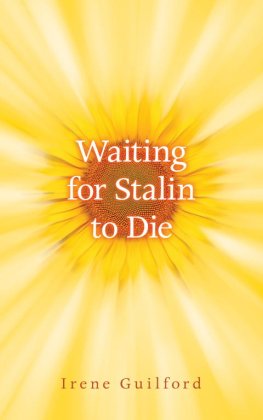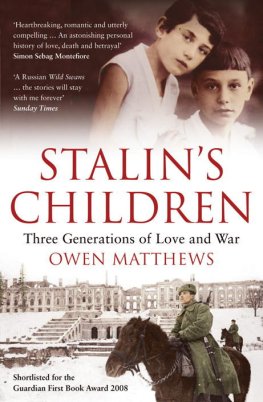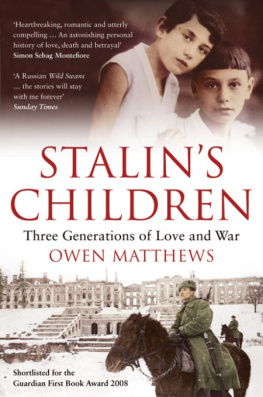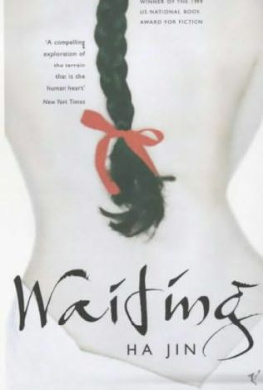Irene Guilford

WAITING FOR STALIN TO DIE
for Nigel

VYTAS

TORONTO

1949
 He dreams of Vilnius. Night after night he dreams of the city which he left, though he did not wish to. And he dreams of Lidia, his lost love.Waking in the dark, he sits up in bed, arms around his knees. He gnaws the backs of his hands. He chews the inside of his lips and cheeks. He eats his grief, taking it into himself like food.Lidia. If we had not left she would not be lost. In the morning, the dream is gone. His home. His love. His life.
He dreams of Vilnius. Night after night he dreams of the city which he left, though he did not wish to. And he dreams of Lidia, his lost love.Waking in the dark, he sits up in bed, arms around his knees. He gnaws the backs of his hands. He chews the inside of his lips and cheeks. He eats his grief, taking it into himself like food.Lidia. If we had not left she would not be lost. In the morning, the dream is gone. His home. His love. His life.
Chapter 1

Though not a joking man, Vytas would say years later that he had become a doctor again by accident. Surrounded by family in his Baby Point garden, sitting in the deep greenery, he would tell a story which happened to be true. His three married daughters would be setting out a summer lunch. His three sons-in-law would lift their heads from quiet political talk. And while the grandchildren sat at his feet, spellbound by events, the adults heard the oceans of meaning behind the words.
Every Sunday morning, I used to walk in High Park.
He had stopped before Lidias picture as always before going out. Gazing at her love-filled face, aching for her presence in just the next room, he turned his Swiss army knife over and over in his pocket. Wont be long, he wanted to call out. And hefting the smooth red enamel handle, feeling the weight of the blades hidden inside, he wondered if he would become one of those lonely old bachelors who absentmindedly jingled coins in their trouser pockets.
He had stood at Hilltop Gardens, looking out over Grenadier Pond. The British Grenadiers had gone through the ice on their way to fight the Americans in 1812. This history was not his. His lived in a faraway land. He carried it inside him. And looking down at the large red Maple Leaf Garden, he felt surrounded by a history without meaning.
He descended to a pond at the parks heart, a dark shallow pool where people threw bread to the ducks. Walking along the rim, head bent, tread rhythmic, he would think of Lidia. The smooth green water calmed and soothed. In these moments, memory sweetened rather than stung. And pausing, looking up, he would squint past the sunlight piercing through the leaves.
A father and young daughter entered along Spring Road, a short stump of a street off Parkside Drive. Wearing a white shirt, fine grey slacks and expensive loafers, the man moved with ease. Even from a distance, Vytas could tell they were moneyed people. He sensed the mans casual belonging. And conscious of his brown and white pinstriped suit from the DP camps, Vytas felt himself to be the outsider that he was.
The little girl skipped alongside her father in a yellow sundress and black patent leather shoes. Approaching the pond, she tossed bread onto the dark surface of the water. Ducks snatched at the bobbing bits. The child clapped her hands in delight. And in the joyful look she turned towards her father, Vytas saw an untroubled childhood, a home secure and safe.
The father tipped a brown paper bag towards his daughter, offering her a plum. Sitting side by side on the low stone wall, they ate fruit. Juice dribbled down the girls chin. The father wiped it away. And holding out his palm, he waited for the plum stone.
Spit, Vytas could see the father mouth.
Plums. How Vytas had loved them as a boy.
His uncles strong hands had lifted him up into the orchard trees, holding him by the waist as he reached past scratchy branches to twist free a plump fruit. Trailing behind his mother and her brother, biting through the purple skin to the golden flesh beneath, he had heard drifting snatches of conversation. You must come with us, she had said. And watching his uncle shaking his head, slow and sad, he knew it would be their last visit.
The little girl shrieked with excitement and pointed. A swan was swimming in their direction. She dashed towards it. Stop, the father cried, pounding after the child with a plum stone still in her mouth. Stop!
She pulled up short. She fell to the pavement with a soft thud.
Vytas raced towards her. He dropped to one knee. She was rasping for air. Her face was becoming purple. Her eyes were rolling back in their sockets. He had, at most, one minute.
Doctor, he said, jabbing at his chest.
Frozen, the white-faced father nodded.
Vytas opened his Swiss army knife. He cut a small slit in the girls throat. He tossed aside the ink cartridge from his ballpoint pen. He slid the hollow tube into her trachea. The girl sucked air. Her chest heaved. And watching the purple fading from her face, he sat back on his heels in relief.
Ambulance, Vytas said to the stunned father, who took off towards Parkside Drive.
Vytas crouched beside the child, holding both her hands in one of his. He stroked her hair. He smiled into her frightened eyes. And keeping her still, he murmured to her in Lithuanian.
Nebijok, pupele. Dont be afraid, little one.
It was late afternoon when Vytas returned home. Only after climbing into the ambulance with Mr. Taylor and Anita to accompany them to the hospital, only after assuring the grateful father that his child could be safely released, only then had he, too, been allowed to go home. He climbed the stairs to his room. He shut the door. And lifting Lidias photo to his lips, he kissed it.
Mr. Taylor happened to be the Taylor of Gordon and Taylor, Barristers and Solicitors. He lived on High Park Gardens, next door to Dr. Griffin, dean of the Medical School. On Sunday morning, the two men stood talking on their sunlit lawns. As Mr. Taylor described the swift actions of the young foreigner who had saved his daughters life, Dr. Griffins eyes widened. Always on the lookout for quickthinking young doctors, the dean said, Send him to me.
Later that day, while Vytas and his parents were eating lunch in their landladys kitchen, the phone rang. Lifting their heads from their food, they wondered who would interrupt a Sunday family meal. Their landlady answered. She said it was for Vytas. And wiping his mouth with a paper napkin, he rose to see who was calling.
It was Mr. Taylor. He wanted Vytas to meet Dr. Griffin. In gratitude for services rendered, one good turn deserving another, so to speak.
Vytas gripped the receiver. As the words rolled over him, he grasped at phrases he didnt understand. Nevertheless he got the gist. Medical School. Chance. And holding the receiver to his ear, he felt the pulsing future.

His mother Juze was a sparkling creature, small, compact and fiery, warm-hearted and kind. She was also shrewd, her wits having saved son and husband from danger more than once. A coy smile at an officer. A bit of charm in the right place. Her lover, Alex, had had been killed in the war. Vytas was the unborn child he had never seen. Grief had transmuted into a passion, rivalling no other, for the child of a lover who lay dead in a field.
It was Brunius, not Alex, who had descended from the train. Coming towards her on the crowded station platform in Vilnius, taking her hand, he had given her the news. She had slumped against him. And there she had remained. After a short, respectful courtship, they had married, united by a battlefield promise made to a dying comrade.












 He dreams of Vilnius. Night after night he dreams of the city which he left, though he did not wish to. And he dreams of Lidia, his lost love.Waking in the dark, he sits up in bed, arms around his knees. He gnaws the backs of his hands. He chews the inside of his lips and cheeks. He eats his grief, taking it into himself like food.Lidia. If we had not left she would not be lost. In the morning, the dream is gone. His home. His love. His life.
He dreams of Vilnius. Night after night he dreams of the city which he left, though he did not wish to. And he dreams of Lidia, his lost love.Waking in the dark, he sits up in bed, arms around his knees. He gnaws the backs of his hands. He chews the inside of his lips and cheeks. He eats his grief, taking it into himself like food.Lidia. If we had not left she would not be lost. In the morning, the dream is gone. His home. His love. His life.
